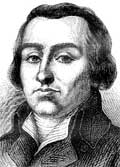 |
Pierre-Joseph Cambon
b. 10 Jun 1756, Montpellier, Hérault
d. 15 Feb 1820, Saint-Josse-ten-Noode, near Brussels, Netherlands (now Belgium) |
| Title: |
Président de l'Assemblée nationale (President of the National Assembly) |
| Term: |
16 Sep 1792 - 21 Sep 1792 |
| Chronology: |
16 Sep 1792, election as president proclaimed by the National Assembly, morning session of the Assembly, Salle du Manège, Paris [1, vol. L, p. 39]; assumed the chair at the evening session [1, vol. L, p. 52] |
|
21 Sep 1792, announced the dissolution of the National Assembly upon receiving the report on the installation of its constitutional successor, Convention nationale (National Convention), session of the Assembly, Salle du Manège, Paris [1, vol. L, p. 201] |
| Names/titles: |
Président de la Convention nationale (President of the National Convention) (19 Sep 1793 - 3 Oct 1793) [see details] |
| Biography: |
| Descended from a family of cloth merchants; after the father's retirement (1785), managed the family firm at Montpellier, Hérault, and was a founder of the Frères Cambon et Compagnie; served as a municipal officer at Montpellier (from 1790); elected as a representative of the Third Estate of Montpellier to the États-Généraux (Estates-General); participated in the sessions of the Assemblée nationale (National Assembly) and took the Tennis Court oath (20 Jun 1789); election was voided (25 Jul 1789) due to exceeding the number of seats for Montpellier prescribed by electoral regulations; elected (3 Sep 1791) as a representative of Hérault to the National Assembly (1791-1792); was actively involved in the debates over financial matters; served as Vice President (5 Sep 1792 - 16 Sep 1792) and President (16 Sep 1792 - 21 Sep 1792) of the National Assembly; supported the moderate Girondin faction and helped secure the safety of the royal family during the insurrection of 10 Aug 1792; was elected to the Convention nationale (National Convention) (1792-1795) as a deputy for Hérault; emerged as very influential member of the committee for finance; voted for the death sentence in the trial of King Louis XVI; member of the Comité de salut public (Committee of Public Safety) (7 Apr 1793 - 10 Jul 1793); in political views, drifted to the Jacobins, but opposed Maximilien Robespierre; proposed to draw up the Grand Livre of the national debt; served as President of the National Convention (19 Sep 1793 - 3 Oct 1793); denounced Robespierre during the coup of 9 Thermidor, Year II (27 Jul 1794); escaped arrest decreed by the National Convention for his involvement in the insurrection of 1 Apr 1795, went into hiding; was proclaimed mayor of Paris (20 May 1795) at an insurgent rally in the Hôtel de Ville, never assumed the office; amnestied (26 Oct 1795) and retired to his private estates; during the Hundred Days (Cent Jours), was elected (15 May 1815) a deputy of the Chambre des représentants (Chamber of Representatives) from Hérault; banished as a regicide (1816); moved to the Kingdom of the Netherlands and lived near Brussels until his death.
Biography source: [3] |
| Elections: |
| Candidate |
Votes (16 Sep 1792) |
| Pierre-Joseph Cambon |
220 |
| voters/absolute majority |
231/116 |
|
| Election source: [1, vol. L, p. 39]
|
| |
| [1] |
Archives parlementaires. Série 1, |
| [2] |
Procès-verbal de la Convention nationale, imprimé par son ordre; (Paris: Imprimerie nationale, 1792-an IV) |
| [3] |
Dictionnaire de biographie française (Paris: Letouzey et Ané, 1933-). |